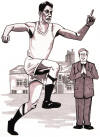
2006/2007 SEASON
Preliminary
information sheet - updated
4/9/07
Here is some basic information about our upcoming season - our
46th!! including
our inaugural performances at
SOPAC
* <please note several changes
in prices, location, performance schedule, and phone
numbers>
The dates for the Theatre in '06-'07 are
as follows:
Oct. 20,21,22, 27,28,29
| *Dec. 1,2,3,6,7,8,9
| *Feb. 23,24,25,28,Mar
1,2 | *April 20,21,22
* performances at
SOPAC
{South Orange Performing Arts Center}
*
As
You Like it
by
William Shakespeare
{ directed by Professor
James P. McGlone }
F 10/20 , Sa 1O/21 , Su 1O/22 matinee,
F 10/27 , Sa 1O/28, Su 1O/29 matinee
The
O'Conner Girls
by
Katie Forgette
{ directed by Professor Peter Reader }
F 12/1 , Sa 12/2, Su 12/3 matinee,
W 12/6 ,
Th 12/7 , F 12/8
Sat
12/9
 _See How They Run
_See How They Run
by
Phillip King
{directed by Professor
James P. McGlone }
F
2/23
,
Sa 2/24
, Su 2/25 matinee
W
2/28 , Th
3/1 , F
3/2
_Dead
Man Walking
by Tim Robbins
{ directed by Professor Deirdre Yates }
F 4/20 , Sa
4/21 , Su
4/22 matinee ,
Su
4/22 evening
**please
note several changes in prices, location, performance schedule,
and phone numbers**
*
All evening performances
begin at 8:00 and matinees are at 2:00.
*
As You Like It
performs in the
Theatre-in-the-Round in the University Center
on the campus. All other performances take place
in
SOPAC
(South Orange Performing Arts Center, 1
Trenchard Place-behind
the Train Station)
*
Ticket Prices:
$15.00 –
Regular
$12.00
Senior Citizens,
& Children, & SHU Alumni
$8.00 – SHU
Students[One
ticket per ID], Faculty, & Staff –
- For reservations and general information, please call:
(for
As You Like It:Ticket
Office: 973-761-9098 or Arts Council: 973-313-6338 /
for remaining productions call SOPAC: 973-313-2787
-
For this season, for Group Rates, Subscriptions &
information, contact: the Arts Council: 973-313-6338
DIRECTOR'S
NOTES -- EXCERPTS:
|
As You Like It
- notes
by Professor
James P. McGlone
Dear Patron:
Shakespeare didn't seem much concerned with titles. All's Well That
Ends Well, Much Ado About Nothing, and As You Like It
give critics enough ready made headlines to shoot down any production.
Maybe the Bard was so sure of his talent, he felt like challenging the
reviewing fraternity.
As it happens - interesting that he never used that as a title -
As You Like It is considered one of his most lyric as well as one of his
most popular plays. To begin with - I keep coming up with these
titles, don't I? - the reason for his success with this script is
the enchanting language, lovely musical interludes, the witty repartee,
and the ingenious resolution to a complicated plot. Along side his
charming sonnet of the seven ages of man is my favorite Shakespearean
curse, to wit: " Sell while you are able, you are not for all markets."
No, I'm not selling you on As You Like It on the grounds that it teaches
effective cursing. I merely suggest that, as students of the spoken
word, whatever emotion or idea that Shakespeare decided to explore, he
did it with eloquence, aptness, humor, and in high spirits. And all
through the spoken word -- sometimes referred
to as Oral Communication.
So, let me entertain you - another title but already used in a song
- with pranks and pratfalls, with love songs and lovesick comics,
with compliments and curses all composed and contrived As You Like It.
All the best,
James P. McGlone
|
|
The
O'Connor Girls
- notes
by Professor Peter Reader
Director's
Notes:
is |
|
See How They Run
- notes
by Professor
James P. McGlone
Dear Patron:
Have you noticed that the word "farce" has somehow
gotten a bad name? How often have you heard
someone proclaim an event that ended in confusion as "a complete farce?"
Almost anything we wish to denigrate seems to fit that title.
Well, I want you to know, I think that Farce is a perfectly respectable
theatrical method of giving the world a good laugh. To begin with, at least
in old fashion farces, most of the characters are silly but nice. We laugh
at their silliness but we enjoy their innocent company. Think of
Charley's Aunt or You Can't Take It With
You -- one rehearses the irresponsibility of
undergraduate life, and the other gives us a method to cope with depression,
economic, that is. And it's not easy to put together an effective production
of a farce. Everybody needs to come in the doors at the exact moment.
Furthermore, the denizens of the genre take themselves seriously so that you
have the luxury of laughing at the accumulating
mayhem. Finally, the mayhem must increase through three acts to a resolution
that occurs just as the final curtain descends.
Of course, you are not supposed to take it all to heart. It takes a leap of
faith to accept the pretences of the plot. In other words, you have to bring
with you to the theatre your ability to make-believe. Have we, I wonder,
lost our capacity for the outrageous? Are we unable to let go of our
sophistication and just enjoy the fun of the whole thing? Has there been, as
Walter Kerr wrote some forty years ago, "a decline of pleasure?" Do we feel
guilty about just having a good laugh with our friends?
I can't answer that question for you, but I can assure you that we have had
a rip-roaring good time rehearsing See How They Run. We can only hope
that you will share in our delight in mistaken identity,
people making strange exits and entrances, and the general riot that makes
up our evening together.
All the best,
Jim McGlone
|
|
_Dead Man Walking_
= notes by Professor Deirdre Yates }
Director's
Notes:
To our audience,
Well, from the first moment I spoke with Sister Maureen Fenlon, the National
Coordinator of the DEAD MAN WALKING SCHOOL THEATRE PROJECT, I knew I was
becoming part of something bigger than just directing a play! As Sister
Helen says in the play, "What am I getting myself into?"
Happily what I found myself getting into was an enriching, educational and
emotional journey. On behalf of the entire cast and crew of DEAD MAN
WALKING, I welcome you to our journey with the hopes that you too will be
enriched, educated and moved.
From conversations with New Jerseyans for Alternatives to the Death Penalty,
to David Kaczynski's presentation on turning his brother in as the
Unabomber, to a film series covering reconciliation for victims' families,
to a woman's perspective on the death penalty from Patricia Clark at Seton
Hall's Women's Conference to meeting Sister Helen Prejean herself, I have
learned about the power of this play. Forgiveness, a grace not easily
achieved, is at the heart of Sister Helen's message, the Catholic Church's
message and the message of this play. It is a privilege to be a part of
sharing such a noble mission.
I would like to thank, at least a few of, the many people who helped me
along the way. Without an award from David Foster and the Center for
Vocation and Servant Leadership, this project would never have come to
fruition. Abraham Bonowitz, from New Jerseyans for Alternatives to the Death
Penalty, has been a constant source of ideas, speakers and support. The
Dean's Office of the College of Arts and Sciences, particularly Susan
Kilduff, and the Department of Communication have helped enormously. And, in
no small way, the students of PRSSA and the faculty and students of Seton
Hall have embraced the entire death penalty campaign and implemented it to
the fullest. So, many thanks!
Finally, I close with the words of Tim Robbins: "Dig into the issue. Get
informed. Make theatre. Take action."
We have.
Professor Deirdre Yates
|

